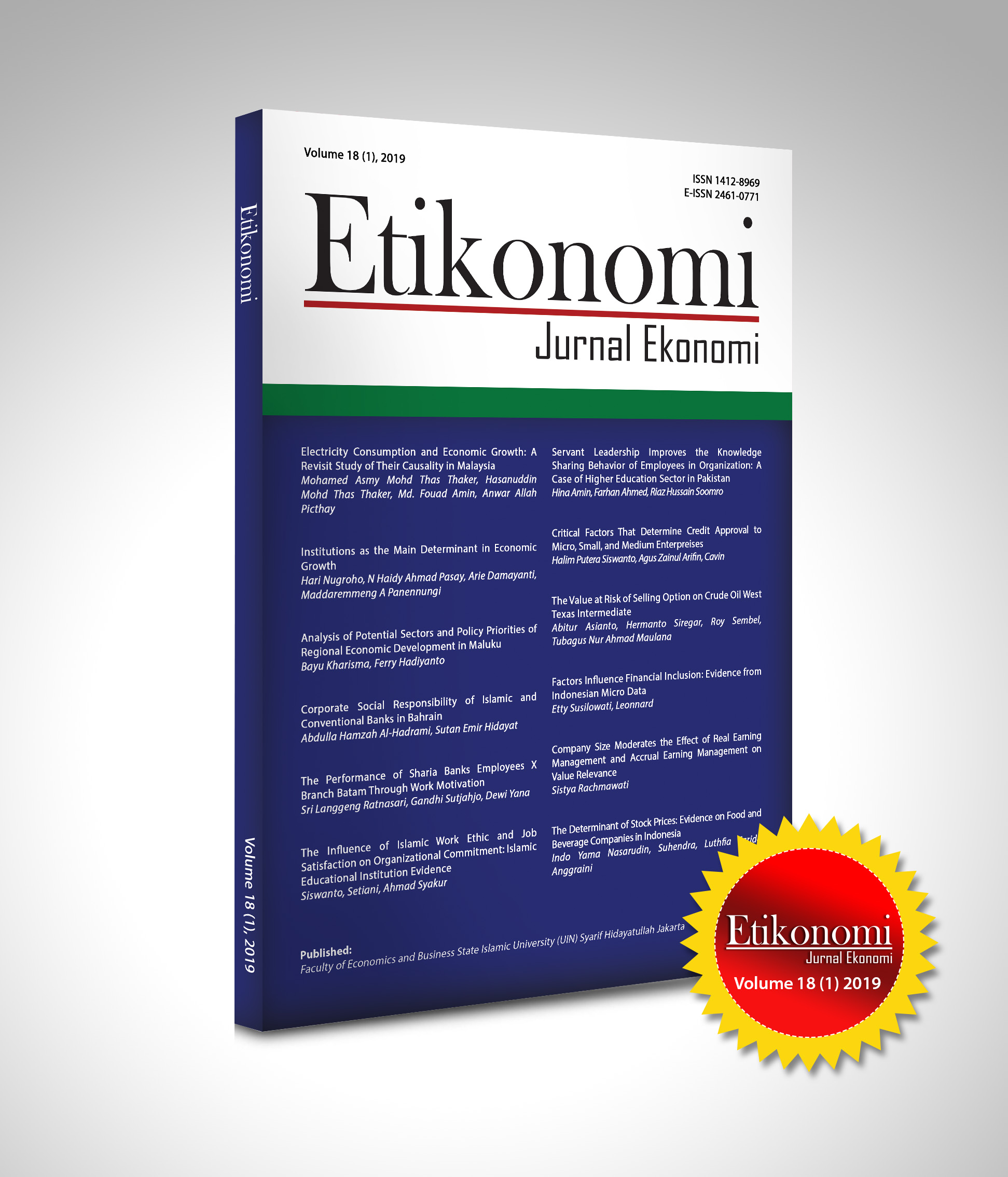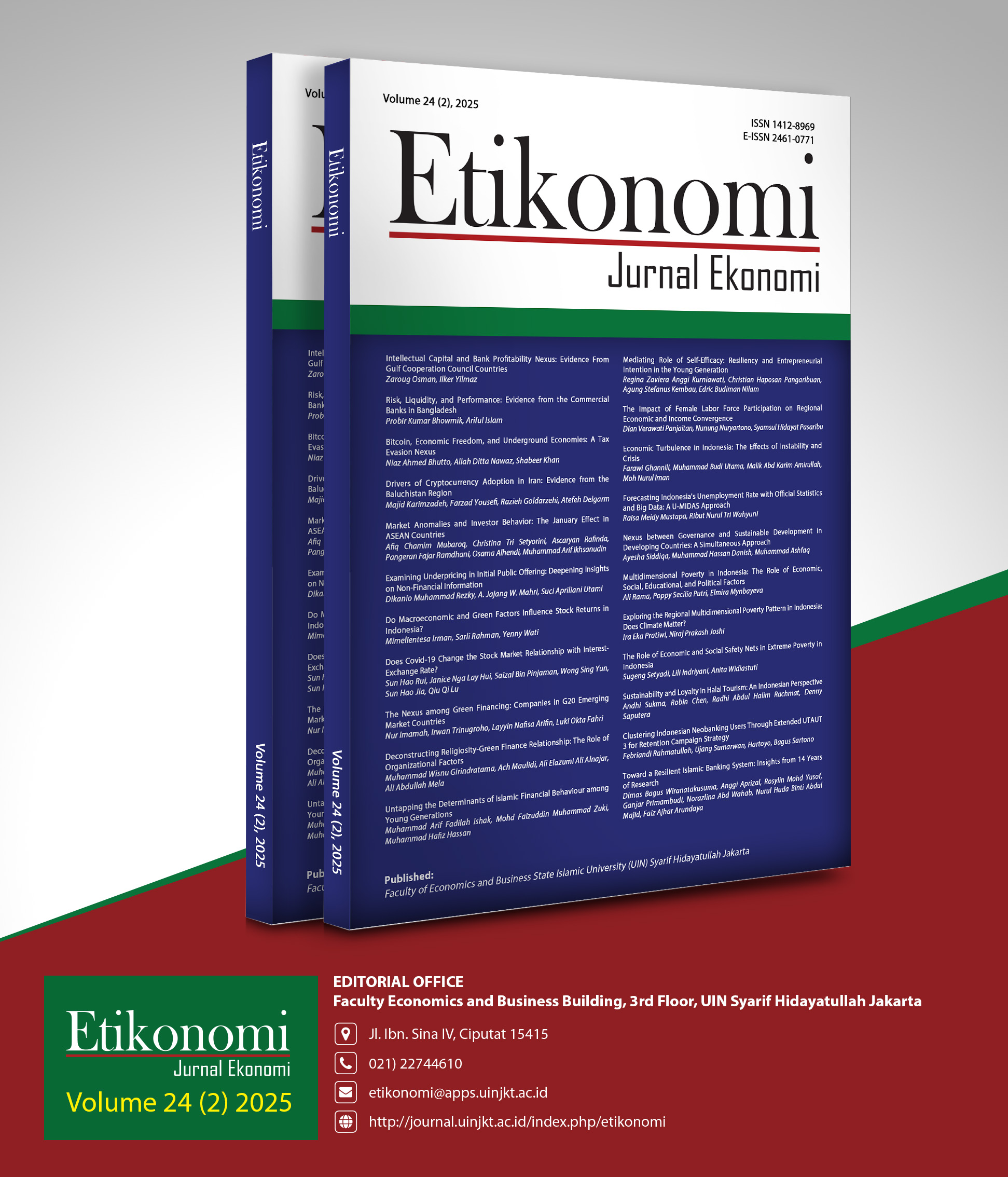Corporate Social Responsibility of Islamic and Conventional Banks: Evidence in Bahrain
DOI:
https://doi.org/10.15408/etk.v18i1.10395Keywords:
corporate social responsibility, Islamic banks, conventional banksAbstract
Several researchers found a positive relationship between the company's performance and corporate social responsibility (CSR) activities. The current study aims to explore the clients' awareness and perception of CSR in Islamic and conventional banks across Bahrain. The study surveyed 305 clients that 175 from the Islamic banks, and 130 from the conventional banks. The results indicated that the clients of Islamic banks are more aware of their banks CSR activities than the clients of conventional banks. The result shows that Islamic banks clients have a more positive perception of their banks' CSR than those of the conventional banks. Additionally, the results indicated that there are statistically significant differences in the clients' awareness and perception of banks' CSR activities when the client's group according to age, income, education, and bank type.
JEL Classification: G21, M14
Downloads
References
Belal, A. R., & Roberts, R. W. (2010). Stakeholders’ Perceptions of Corporate Social Reporting (CSR) in Bangladesh. Journal of Business Ethics, 97(2), 311–324. https://doi.org/10.1007/s10551-010-0511-4
Brown, T. J., & Dacin, P. A. (1997). The Company and the Product: Corporate Associations and Consumer Product Responses. Journal of Marketing, 61(1), 68–84.
Chaudary, S., Zahid, Z., Shahid, S., Khan, S. N., & Azar, S. (2016). Customer perception of CSR initiatives: its antecedents and consequences. Social Responsibility Journal, 12(2), 263–279. https://doi.org/10.1108/SRJ-04-2015-0056
Chu, C. F., & Yang, P. P. (2009). Empirical Examination of Relationship Between Corporate Social Responsibility and Financial Performance. Financial Forum, 7, 135–137.
Chu, S. C., & Lin, J. S. (2013). Consumers’ Perception of Corporate Social Responsibility in the United States and China: A Study of Female Cosmetics Consumers. International Journal of Strategic Communication, 7(1), 43–64. https://doi.org/10.1080/1553118X.2012.711401
Drumwright, M. (1994). Socially Responsible Organizational Buying: Environmental Concern as a Non-economic Buying Criterion. Journal of Marketing, 58(3), 1–19. https://doi.org/10.2307/1252307
Dusuki, A. W., & Dar, H. (2007). Stakeholders’ Perceptions of Corporate Social Responsibility of Islamic Banks:Evidence from Malaysian Economy. In The 6th International Conference on Islamic Economics and Finance.
Elsakit, O. M., & Worthington, A. C. (2012). The Attitudes of Managers and Stakeholders towards Corporate Social and Environmental Disclosure. International Journal of Economics and Finance, 4(12), 240–251. https://doi.org/10.5539/ijef.v4n12p240
Fatma, M., & Rahman, Z. (2016). The CSR’s Influence on Customer Responses in Indian Banking Sector. Journal of Retailing and Consumer Services, 29, 49–57. https://doi.org/10.1016/j.jretconser.2015.11.008
Gregory, J., & Miller, S. (1998). Science in Depositors: Communication, Culture & Credibility. Massachusetts: Perseus Publishing.
Handelman, J., & Arnold, S. (1999). The Role of Marketing Actions with a Social Dimension: Appeals to The Institutional Environment. Journal of Marketing, 63(3), 33–48. https://doi.org/10.2307/1251774
Hidayat, S. E., & Abduh, M. (2012). Does Financial Crisis Give Impacts on Bahrain Islamic Banking Performance? A Panel Regression Analysis. International Journal of Economics and Finance, 4(7), 79–87. https://doi.org/10.5539/ijef.v4n7p79
Hidayat, S. E., & Al-Hur, S. A. (2015). A Survey on Depositors’ Awareness towards Corporate Social Responsibilities Practices of Islamic Banks in Saudi Arabia. Journal of Islamic Economics, Banking, and Finance, 12(1), 172–193.
Khursid, M. A., Al-Aali, A., Soliman, A. A., & Amin, S. M. (2014). Developing an Islamic Corporate Social Responsibility Model (ICSR). Competitiveness Review, 24(4), 258–274. https://doi.org/10.1108/CR-01-2013-0004
Klein, J. G. (2004). Special Session Summary Corporate Social Responsibility: a Consumer Perspective. Advances in Consumer Research, 31, 101–103.
Mohammed. (2007). Corporate Social Responsibility in Islam. (Unpublsihed Dissertattion). New Zealand: Auckland University of Technology.
Özkan, A., & Tanç, Ş. G. (2012). The Research for the Awareness Level of the Hotel Business About the Social Responsibility and Accountability Concepts. Journal of US-China Public Administration, 9(1), 90–96.
Peters, R., & Mullen, M. R. (2009). Some Evidence of The Cummulative Effects of Corporate Social Responsibily on Financial Performance. Journal of Global Business Issues, 3(1), 1–14.
Pomering, A., & Dolnicar, S. (2009). Assessing the Prerequisite of Successful CSR Implementation: Are Consumers Aware of CSR Initiatives? Journal of Business Ethics, 85(2), 285–301.
Potepkin, M., & Firsanova, O. (2017). Customer Perception of CSR Activities: A Comparative Study of Finnish and Russian Consumers. Baltic Journal of European Studies, 7(2), 59–83. https://doi.org/10.1515/bjes-2017-0010
Ramasamy, B., & Ting, H. W. (2004). Social Responsibility Awareness A Comparative Analysis of Corporate. Journal of Corporate Citizenship, 13, 109–123.
Rhou, Y., Singal, M., & Koh, Y. (2016). CSR and Financial Performance: The Role of CSR Awareness in The Restaurant Industry. International Journal of Hospitality Management, 57, 30–39. https://doi.org/10.1016/j.ijhm.2016.05.007
Rivera, J. J., Bigne, E., & Curras-Perez, R. (2016). Effects of Corporate Social Responsibility Perception on Consumer Satisfaction with The Brand. Spanish Journal of Marketing, 20(2), 104–114. https://doi.org/10.1016/j.sjme.2016.06.002
Sen, S., & Bhattacharya, C. B. (2001). Does Doing Good Always Lead to Doing Better? Consumer Reactions to Corporate Social Responsibility. Journal of Marketing Research, 38, 225–243.
Smith, C. N., Read, D., & López-Rodriguez, S. (2010). Consumer Perceptions of Corporate Social Responsibility: The CSR Halo Effect (INSEAD Working Paper No. 2010/16/INSEAD).
Wang, D. H. M., Chen, P. H., Yu, T. H. K., & Hsiao, C. Y. (2015). The Effects of Corporate Social Responsibility on Brand Equity and Firm Performance. Journal of Business Research, 68(11), 2232–2236. https://doi.org/10.1016/j.busres.2015.06.003
Wilson, R. (2001). Business Ethics: Western and Islamic Perspectives. In A. M. Sadeq (Ed.), Ethics in Business and Management: Islamic and Mainstream Approach. London: ASEAN Academic Press.
Yadav, R. S., Dash, S. S., Chakraborty, S., & Kumar, M. (2018). Perceived CSR and Corporate Reputation: The Mediating Role of Employee Trust. Vikalpa, 43(3), 139–151. https://doi.org/10.1177/0256090918794823














